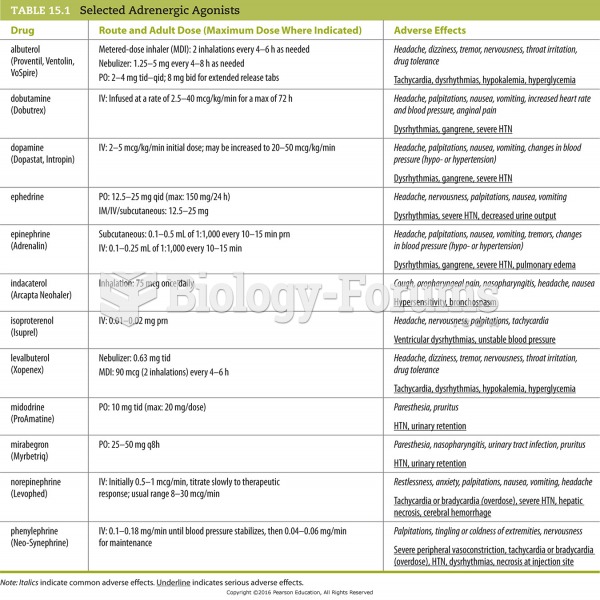Answer to Question 1
4
Rationale 1: Inhaled beta-adrenergic drugs produce little systemic toxicity because only small amounts of the drug are absorbed. When given orally, a longer duration of action is achieved, but systemic side effects such as tachycardia and tremor are more frequently experienced.
Rationale 2: Both the oral and inhaled forms cause bronchodilation.
Rationale 3: Beta-adrenergic drugs do not decrease inflammation.
Rationale 4: Inhaled beta-adrenergic drugs produce little systemic toxicity because only small amounts of the drug are absorbed. When given orally, a longer duration of action is achieved, but systemic side effects such as tachycardia and tremor are more frequently experienced. Beta-adrenergic drugs do not decrease inflammation; both the oral and inhaled forms cause bronchodilation.
Global Rationale: Inhaled beta-adrenergic drugs produce little systemic toxicity because only small amounts of the drug are absorbed. When given orally, a longer duration of action is achieved, but systemic side effects such as tachycardia and tremor are more frequently experienced. Beta-adrenergic drugs do not decrease inflammation; both the oral and inhaled forms cause bronchodilation.
Answer to Question 2
3
Rationale 1:Relief of symptoms and suppression of immune system is incorrect because the goals are to prevent occurrence and relief of symptoms.
Rationale 2:The goals are to prevent occurrence and relief of symptoms.
Rationale 3: The therapeutic goals of treating allergic rhinitis are to prevent its occurrence and to relieve its symptoms. Drugs used to treat allergic rhinitis may thus be grouped into two basic categories: preventers and relievers.
Rationale 4:Suppression of cough and immune system is incorrect because the goals are to prevent occurrence and relief of symptoms.
Global Rationale: The therapeutic goals of treating allergic rhinitis are to prevent its occurrence and to relieve its symptoms. Drugs used to treat allergic rhinitis may thus be grouped into two basic categories: preventers and relievers.







